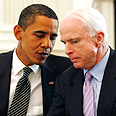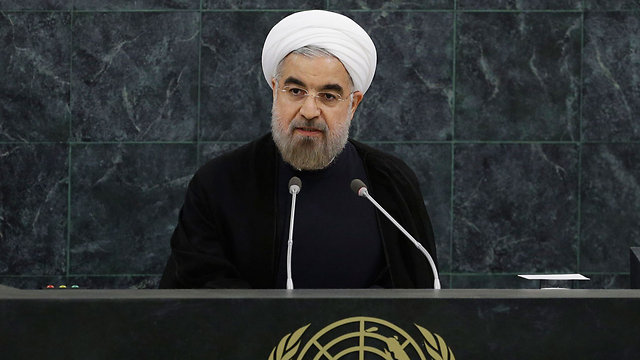
After Syria, US Congress wary of Obama's Iran thaw
'We must not allow Iran to use negotiations as a tool of delay and deception,' say Republican Senators McCain, Graham and Ayotte
After balking at President Barack Obama's plan to attack Syria, the US Congress is also stirring in opposition to his latest foreign policy goal: An effort to improve relations with Iran.
Congress imposed sanctions that are damaging the Iranian economy and, according to US officials, are responsible for a moderate tone from Iran's new leadership, which will restart talks this week over its nuclear program.
Related stories:
- PM: Don't be fooled by Iran
- Rohani: Nazi crimes against Jews 'reprehensible'
- Analysis: Rohani speech proves sanctions stifling Iran
US lawmakers have the power to lift sanctions if they think Tehran is making concessions and scaling back its nuclear ambitions, but many Republicans and some of Obama's fellow Democrats are skeptical about a charm offensive by new President Hassan Rohani.
"We need to approach the current diplomatic initiative with eyes wide open, and we must not allow Iran to use negotiations as a tool of delay and deception," Republican Senators John McCain, Lindsey Graham, and Kelly Ayotte said in a statement.
Many US lawmakers are deeply supportive of Israel and suspect Iran is trying to build a nuclear weapons capability, one of the few areas where bitterly divided Republicans and Democrats agree on policy.
"Congress has no stake in giving Iran the benefit of the doubt, period. And until they see something quite dramatic on the part of the Iranians, they won't," said Aaron David Miller, a former senior State Department official now at the Woodrow Wilson Center in Washington.
The Senate and House of Representatives have passed repeated packages of tough sanctions on Iran. Obama has the legal right to waive most of them for 120 days, and then another 120 days, as an option if nuclear negotiations with Iran, which begin on Thursday, are going well.
Video courtesy of jn1.tv
In a speech to the United Nations General Assembly, Obama said he was determined to test President Rohani's recent diplomatic gestures and challenged him to take concrete steps toward resolving Iran's long-running nuclear dispute with the West.
"Conciliatory words will have to be matched by actions that are transparent and verifiable," Obama told the annual gathering of world leaders in New York.
In the event Obama were to temporarily waive sanctions, however, it could worsen already bad relations with Congress, which pushed back against the administration, expressing serious misgivings earlier this month about a planned US attack on Syria for its alleged use of chemical weapons.
Lawmakers ended up not taking a vote on Syria, perhaps saving Obama from an embarrassing defeat, but now the White House is at odds with Republican fiscal conservatives in Congress over a possible government shutdown and the debt ceiling.
Failure by Obama to rein in sanctions hawks in Congress could hinder talks on Iran's nuclear program, which Tehran says is peaceful.
"For the Iranians to negotiate with the Obama administration, they have to be convinced that the Obama administration can deliver what they need from Congress," said Jon Alterman of the Center for Strategic and International Studies in Washington.
Rohani hinted at that problem in a speech to the UN General Assembly on Tuesday.
He called for "a consistent voice from Washington" and expressed hope Obama would not be swayed by "war-mongering pressure groups" in dealing with the Iranian nuclear issue.
The Senate Banking Committee is expected soon to begin debating its version of a new package of sanctions that easily passed the House of Representatives in July. The House bill would cut Iran's crude exports to global customers by an additional 1 million barrels per day in a year, on top of US and European Union sanctions that have about halved Tehran's oil sales since 2011.
Deeper cuts in Iran's oil sales could worsen the damage Western sanctions have already done to Iran's economy, which suffered a loss of about $26 billion in petroleum revenue in 2012, soaring inflation, and a devaluation of its currency, the rial.
Republican Representative Ed Royce, chairman of the House Foreign Affairs Committee and a co-author of the new House sanctions bill, dismissed Rohani's speech as rhetoric.
"Through crippling economic sanctions we can continue to increase the pressure on the regime, targeting its ability to pursue a nuclear weapons capability," Royce said in a statement.
Two senior Democrats - Senator Charles Schumer and Robert Menendez, the chairman of the Senate Foreign Relations Committee - joined Republican lawmakers on Monday to call on Obama to stay tough on Iran.
Menendez was unimpressed with the UN speech by Iran's new president.
"While I welcome the statement by President Rohani that Iran is seeking a peaceful and diplomatic path, I was disappointed by the overwhelmingly antagonistic rhetoric that characterized his remarks," he said.
On Tuesday, 11 Republicans who opposed Obama's proposal to strike Syria, led by potential 2016 presidential contender Senator Marco Rubio, urged a hard line on Iran.
"We all agree that Iran should not perceive any weakness as a result of our differences over Syria policy," they said in a letter released while Obama delivered his address to the UN General Assembly in New York.
- Receive Ynetnews updates directly to your desktop











